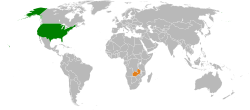United States–Zambia relations
 |
|
United States |
Zambia |
|---|---|
The diplomatic relationship between the United States of America and Zambia can be characterized as warm and cooperative. The United States works closely with the Zambian Government to defeat the HIV/AIDS pandemic that is ravaging Zambia, to promote economic growth and development, and to effect political reform needed to promote responsive and responsible government. The United States is also supporting the government's efforts to root out corruption. Zambia is a beneficiary of the African Growth and Opportunity Act (AGOA). The U.S. Government provides a variety of technical assistance and other support that is managed by the Department of State, U.S. Agency for International Development, Millennium Challenge Account (MCA) Threshold Program, Centers for Disease Control and Prevention, Department of Treasury, Department of Defense, and Peace Corps. The majority of U.S. assistance is provided through the President's Emergency Plan for AIDS Relief (PEPFAR), in support of the fight against HIV/AIDS.
In addition to supporting development projects, the United States has provided considerable emergency food aid during periods of drought and flooding through the World Food Program (WFP) and is a major contributor to refugee programs in Zambia through the UN High Commission for Refugees and other agencies.
According to the 2012 U.S. Global Leadership Report, 59% of Zambians approve of U.S. leadership, with 30% disapproving and 11% uncertain.[1]
U.S. Agency for International Development (USAID)
In 2007, U.S. assistance to Zambia exceeded $259 million. USAID's program in Zambia included over $116 million for HIV/AIDS programs utilizing PEPFAR funding and $11 million to fight corruption and increase trade under the MCA Threshold Program. In addition to programs funded through PEPFAR, the President's Malaria Initiative, and the Millennium Challenge Account Threshold Program, USAID's program in Zambia supported training and technical assistance to promote economic growth through trade and investment; create health and educational opportunities to improve lives; and reduce the impact of HIV/AIDS through multi-sectoral responses.
Peace Corps
A country agreement inviting the Peace Corps to work in Zambia was signed by the United States and Zambia on September 14, 1993. The first group of volunteers was sworn in on April 7, 1994. The Peace Corps program in Zambia has continued to increase with more than 200 American volunteers working to promote sustainable development through their activities in agricultural and natural resource management, health and sanitation, rural education, and humanitarian assistance. Volunteers are working in all of Zambia's nine provinces to build the local capacity to manage family fish farms, develop an innovative paradigm via appropriate technologies, to promote food security and promote positive resource management practices, to implement health reforms at the village level, to promote and support rural education, and to extend HIV/AIDS education and prevention efforts through full participation in PEPFAR. Volunteers live primarily in rural villages in remote parts of the country without running water, electricity, or other amenities. Peace Corps Zambia has one of the highest rates of extension (third-year volunteers) and enjoys successful partnerships with many other aid organizations in Zambia.
Principal U.S. Officials
- Ambassador--Donald Booth
- Deputy Chief of Mission—Michael Koplovsky
- Public Affairs Officer—Christopher Wurst
- Political/Economic Section Chief—Jill Derderian
- Consular Officer—Malia Heroux
- Defense Attaché—Lt. Col. David Dougherty
- Centers for Disease Control and Prevention—vacant
- USAID Mission Director—Melissa Williams
- Peace Corps Director—Thomas Kennedy
Diplomatic missions
The U.S. Embassy in Zambia is in Lusaka. The US Embassy realizes Zambia's potential to become one of Africa's leading free market democracies, and they are committed to aiding critical areas of Zambia's development like human and financial resources. Zambia is one of the 15 countries promised a total of 1.5 billion dollars for AIDS Relief under President Bush's Emergency Plan. In education, the Ambassador's Scholarship Program provides education for 1,500 Zambian boys and girls. The Embassy's Public Affairs Section sends about 15 Zambians a year to the US to participate in International Visitor programs, and brings speakers from the US to Zambia about 4 times a year. It also provides for scholars from the US to come to Zambia for longer stays, and sends Zambians to study in the US on Humphrey and Fulbright Fellowships. To promote economic development, The US government is prepared to forgive 100% of Zambia's bilateral debt when Zambia completes the Highly Indebted Poor Country initiative. Until then, the US government has forgiven all payments of interest and principal on Zambia's half billion dollar debt to the US, and in 2003, $34 million in payments were forgiven.[2]
See also
- Zambian Americans
- Foreign relations of Zambia
- Foreign relations of the United States
References
- International Herald Tribune: "For the hungry in Zambia, U.S. law may hinder urgent food aid"
 This article incorporates public domain material from websites or documents of the United States Department of State (Background Notes).
This article incorporates public domain material from websites or documents of the United States Department of State (Background Notes).
External links
![]() Media related to United States – Zambia relations at Wikimedia Commons
Media related to United States – Zambia relations at Wikimedia Commons
| ||||||||||||||||||||||||||||||||||||||||||||||||||||||||||||||||||||||||||||||||||||||||||||||||||||||||||||||||||||||||||||||||||
| |||||||||||||||||||||||||
.svg.png)
